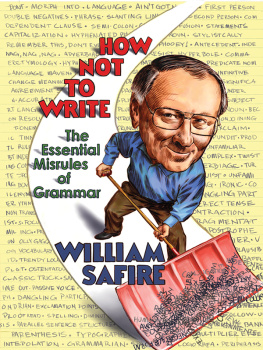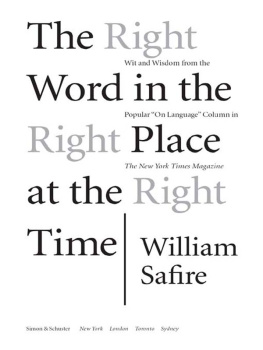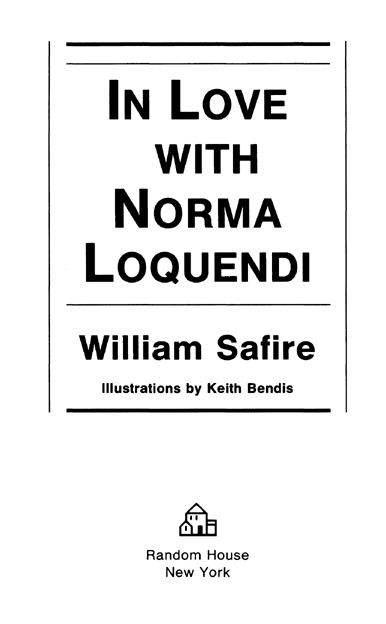Copyright 1994 by The Cobbett Corporation
All rights reserved under International and Pan-American Copyright Conventions. Published in the United States by Random House, Inc., New York, and simultaneously in Canada by Random House of Canada Limited, Toronto.
Grateful acknowledgment is made to The New York Times for permission to reprint 75 On Language columns by William Safire from October 15, 1989, through April 28, 1991. Copyright 1989, 1990, 1991 by The New York Times Company. Reprinted by permission.
Illustrations by Keith Bendis
Library of Congress Cataloging-in-Publication Data
Safire, William.
In love with Norma Loquendi / William Safire.
p. cm.
eISBN: 978-0-307-79975-3
1. English languageUsage. 2. English languageStyle.
I. Title.
PE1421.S223 1994
428dc20 93-36847
v3.1
Oh, somewhere on Elysian plains
Where the light breath of Zephyr stirs
The bosky groves and silvan lanes
Reserved for Lexicographers;
Where with your kind in that long spell
Of peace which no intruder varies
You couch on beds of asphodel
Gently discussing Dictionaries
Sir Owen Seamans tribute to Sir James A. H. Murray,
first editor of the Oxford English Dictionary
Contents
INTRODUCTION
The subject is copulation.
That is known in the trade as a grabber of a lead, attracting on false pretenses those browsing through a family newspaper and looking vainly for sexual arousal.
Whatever copulation means to you, to those of us in the language dodge it means linking, or as Henry Kissinger used to say, linkage. A copulative verb is a hooker (theres a mnemonic that will work)a linking verb, or as a title-writer would say, the grammar connection. As verbs go, its a wimp; no get-up-and-go that we expect from that most exciting of the parts of speech. (I am a verb, said Ulysses S. Grant, in the best self-description of a man of action.)
The copulative verb has no such daring destiny; its function is merely to connect the subject to the word that describes or identifies it. This linking verb is into relationships, denoting a state of being or sensing. In You smell good, They look sad and I feel pretty, smell, look and feel are linkers. In the sentence I am Flotus, so useful in establishing the acronymic identity of the First Lady of the United States, I is the subject, am is the linking verb and Flotus is the predicate nominative.
The what? The predicate nominative. The predicate, which includes the verb, is the part of the sentence that says what is happening to the subject. The predicate nominative is the noun or pronoun part of the predicate that follows a linking verb and stands equal to the subject, referring to it or identifying it; in This is your President speaking, is your President speaking is the complete predicate, and President the predicate nominative that stands for the subject, this.
If you respond to this heavy pedagogy with I am bored, I is the subject, am the linking verb and bored the predicate adjective. If you choose to tell me, You are a bore, you is the subject, are is the linker and bore is the predicate nominative. Nominative, rooted in named, means noun or pronoun. Got it?
Now we come to why you need to have gotten it. The other day, in the elevator, I ran into Jim Schlesinger, the former Cabinet everything. He glared at me and said one word: Him? Others in the elevator assumed the pronoun referred to the President, an assumption automatically made in the nations capital. (Her? would, of course, be taken to refer to Flotus.)
I understood the coded reference. Jim is a purist, an old-line stickler, a man of moorings and standards. He was calling me to account for this reference to Stanley and Livingstone in a previous column: Heres this white man who could be him (yes, him, not he).
My first alert to this apostasy came from Michael Molyneux, who presumes to edit this piece in New York. He pointed out that purists would demand he as predicate nominative, not him, which is in the objective case. That is why I added the parenthetical defiance.
As expected, the Gotcha! Gang struck. My Uofallpeople file bulges with missives like these: Im still in shock over your writing who could be him (yes, him, not he), gasps Edythe Mintz of Bloomfield, New Jersey. Over in Monmouth Beach, Harry Kaplan writes: You have destroyed my faith in the infallibility of Safire. Im afraid I must ask you for substantiation of your stand. From the District of Columbia: Dazzled as I am by your confidence, I cannot think why it should not be he, Edward Weismiller writes. You must believe that the could makes the difference. But could be is still a conjugational form of the verb to be, and a noun or pronoun following that verb must be a predicate nominative.
Safires Rule for Predicate Nominatives: The grammatically pristine form of Woe is me is Woe is I (or even Woe am I), but go tell that to Ophelia and Isaiah. In Hamlet, Ophelia sighs, O, woe is me,/Thave seen what I have seen, see what I see! Desperate nominativeniks would say Shakespeare changed I to me to set up a rhyme with see, but at about that time, translators for King James were rendering Isaiah 6:5 as Then said I, Woe is me! for I am undone; because I am a man of unclean lips. If that does not loosen the must of those insisting on the nominative case of pronouns following a linking verb, then there is nobody here but we chickens. (Us chickens is the way the idiom goes, and when the idiom raises good grammars pot, the wise grammarian folds.)
Captain Oliver Perrys best-remembered line in 1813 was We have met the enemy, and they are ours. The cartoonist Walt Kelly, playing on that line in Pogo, used conversational idiom when he wrote in 1970, We have met the enemy, and he is us. Today that use of us is more common than the hypercorrect he is we would be. And nobody plays around with the pronoun in Toys R Us.
Why does it is me sound better? English word order usually places a direct object, not a subject, after a verb. In his eminently sensible Grammar of the English Language in 1931, George O. Curme favored the nominative I to the objective or accusative me, but he acknowledged, The plain drift of our language is to use the accusative of personal pronouns as the common case form.
Language is not mechanical. When an officious adviser of President William Howard Taft spoke of the machinery of government, Taft said in wonderment to a friend, You knowhe really thinks it is machinery. The structure of language is at least as artistic as politics. The rules laid down by its elites are to be respected, and in writing usually followed, but in the end democracy, which goes by the name of common usage, will work its will. The teachers duty, like the leaders duty in politics, is to resist cheap change and keep good order, but when the population challenges the order over a period of time, Norma Loquendithe everyday voice of the native speakeris the heroine who changes the order and raises a new Standard.
She has drawn a bead on the predicate nominative. If you linger too long on the ramparts, gallantly defending the correct form past its moment, she will let you have it between the it-is-Is. When a word sounds as if it is the object, use the objective form. When Norma knocks, say, Its her, not Its she. (If you object to this new order, stick with the old Not I; you cannot consistently say, Not me.)








